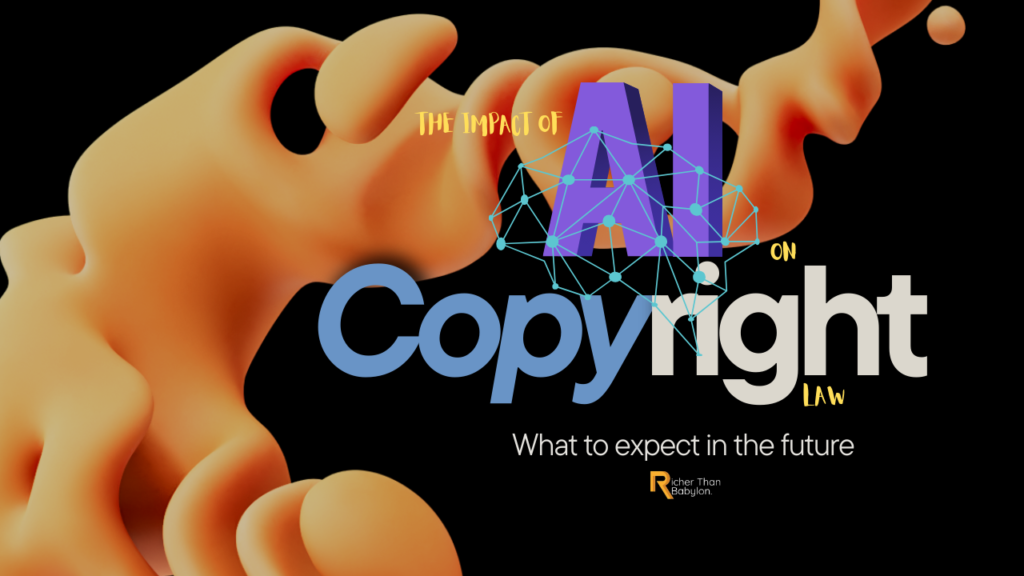One of the most notable advancements in AI is its capability to autonomously produce content. AI algorithms can create music, artwork, literature, and even complete films with little human involvement. This leads to a critical question: who holds the copyright for works created by AI?

AI is changing various sectors, such as healthcare, finance, entertainment, and law.
As AI becomes more embedded in our everyday lives, it presents major legal challenges, especially in copyright law. The intersection between AI and copyright law is a complicated and developing topic that impacts tech enthusiasts, legal professionals, and content creators alike. This article examines the influence of AI on copyright law and what we can anticipate moving forward.
The Rise of AI-Generated Content
One of the most notable advancements in AI is its capability to autonomously produce content. AI algorithms can create music, artwork, literature, and even complete films with little human involvement. This leads to a critical question: who holds the copyright for works created by AI?
Historically, copyright law has centered around the idea of human authorship. The law provides rights to creators of original works, enabling them to control the usage and distribution of their creations. However, when a machine generates a work, the concept of authorship becomes unclear. Some legal systems, such as that of the United States, mandate that a work must be created by a human to qualify for copyright protection. This implies that AI-generated content may not receive copyright protection, potentially placing such works in the public domain.
The Issue of Infringement and Fair Use
Another major concern is how AI technologies may encroach upon existing copyrights. AI algorithms frequently rely on extensive datasets for training, which may contain copyrighted materials. For instance, an AI trained on a large assortment of songs could produce music that closely resembles existing tracks, possibly infringing on the rights of the original artist.
The notion of “fair use” also faces challenges due to AI. Fair use permits limited utilization of copyrighted material without obtaining permission for situations like criticism, commentary, or educational purposes. However, when AI systems employ copyrighted works for training or create new content that resembles existing works, determining what qualifies as fair use becomes increasingly complicated. Courts may need to consider whether using copyrighted material in AI training datasets falls under fair use or necessitates licensing agreements.
Copyright Law and Ethical Considerations
Apart from legal ramifications, ethical concerns must also be discussed. Content creators invest considerable time, effort, and creativity into their work, depending on copyright protection to profit from their creations. If the market becomes saturated with AI-generated content that lacks protection, it could diminish the value of human creators’ work, leading to both economic and creative repercussions.
What’s more, the potential misuse of AI in generating fake or misleading content, such as deepfakes, presents another ethical dilemma. Copyright law may need to evolve to tackle the misuse of AI in creating harmful or deceptive content, striving to balance needing free expression with the necessity of protecting individuals and society from potential harm.
The Future of Copyright Law in AI

As AI continues to advance, copyright law must also progress. Legal professionals, policymakers, and tech companies are already struggling with how to confront the challenges introduced by AI. Several possible strategies could influence the future of copyright law in this domain.
One option is to establish new legal frameworks specifically personalized for AI-generated content. This could include recognizing AI as a co-creator or introducing a new category of rights for works produced by machines. Such frameworks would need to strike a balance among the interests of human creators, AI developers, and the public.
Another approach could involve revising existing copyright laws to address the distinct challenges posed by AI. This might consist of clarifying the criteria for authorship, explaining how fair use applies to AI training, and formulating guidelines for licensing agreements regarding AI-generated content.
International cooperation will also be critical in tackling the global implications of AI and copyright law. Given that AI-generated content can easily transcend borders, countries must collaborate to establish consistent legal standards and enforcement mechanisms.
The effects of AI on copyright law represent a versatile and rapidly changing issue that will greatly influence tech enthusiasts, legal professionals, and content creators. As AI continues to progress, it will challenge traditional ideas of authorship, infringement, and fair use, necessitating adaptations within legal systems. By remaining knowledgeable and actively involved in these developments, stakeholders can contribute to shaping the future of copyright law in a manner that balances innovation with the safeguarding of creative rights.

